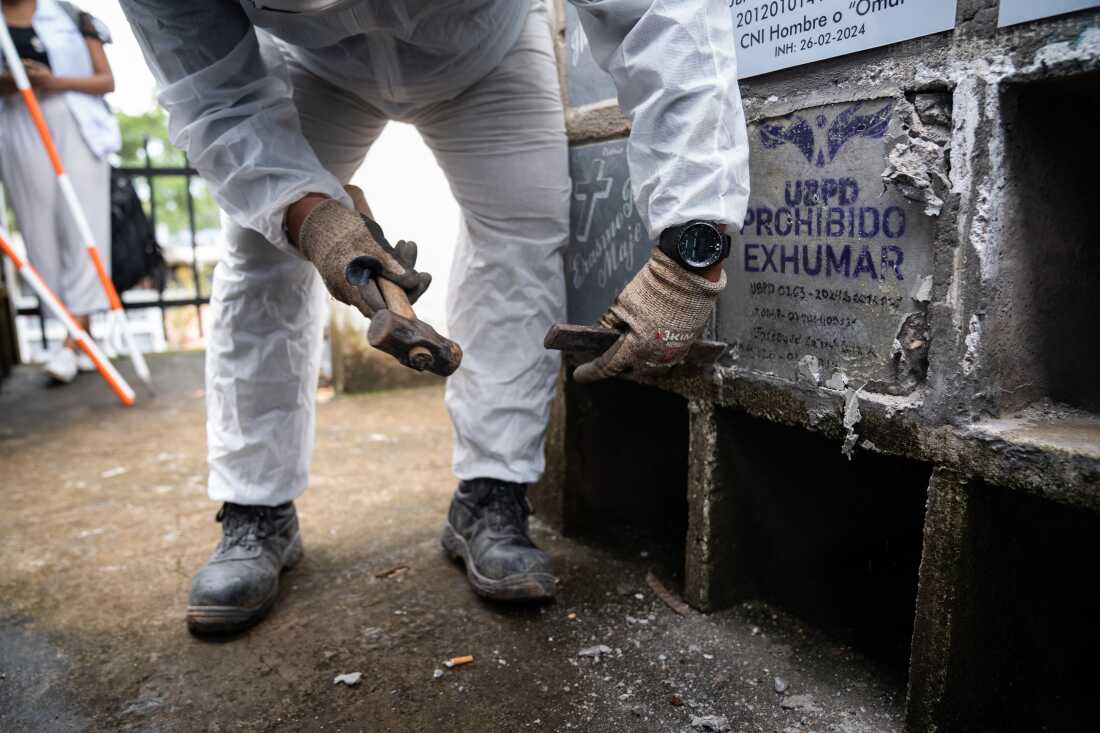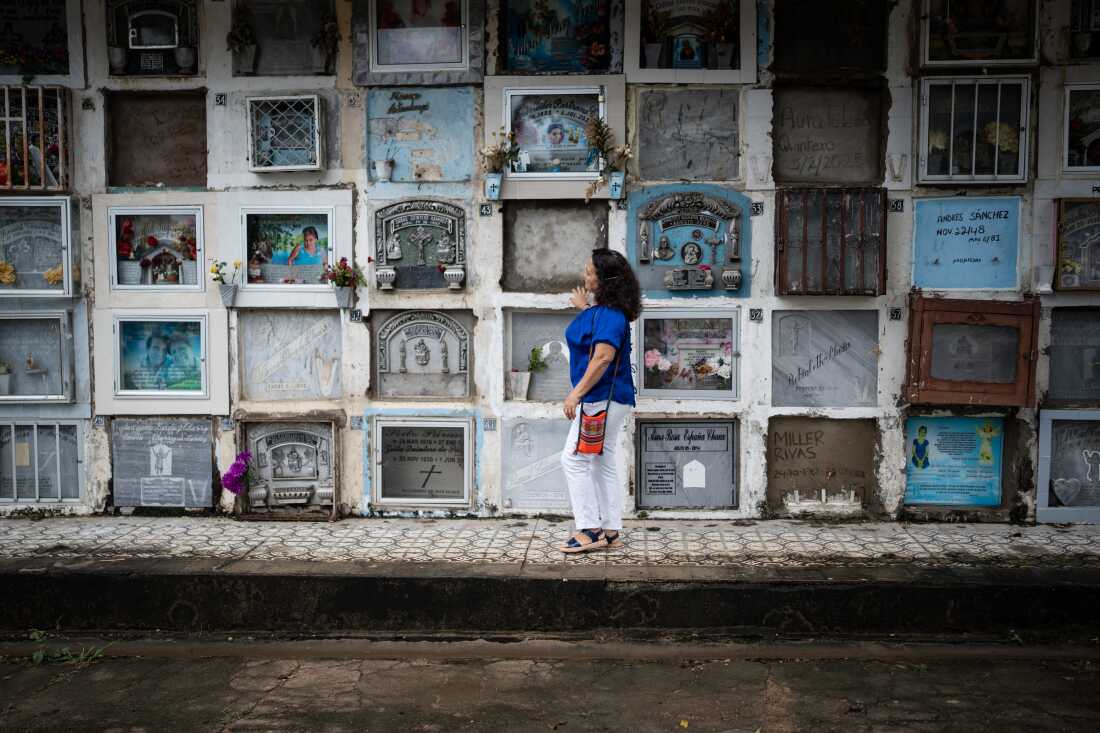
Mario, a former member of the military linked to Colombia’s “false positives” scandal, joins forensic work at Neiva’s Central Cemetery on April 30, 2025 — part of a Special Jurisdiction for Peace (JEP) mandated effort to restore justice and aid victims. Photo: Nathalia Angarita for NPR Nathalia Angarita for NPR hide caption
toggle caption
Nathalia Angarita for NPR
NEIVA, Colombia – As a government task force digs up mass graves in the search for civilians illegally executed during Colombia’s guerrilla conflict, they are getting some hands-on help from the perpetrators of these war crimes.
In a first for Colombia three former army soldiers, wearing white protective suits and armed with trowels and buckets, spent 10 days alongside forensic experts excavating dirt, removing bones and bits of clothing, and bagging up the remains of people killed during the war.
“These were atrocities that never should have happened,” said one of the soldiers during a mid-day break in the exhumations at a cemetery in the central Colombian city of Neiva.
The soldier, a former lieutenant colonel, asked to be identified only by his first name, Mario, for fear of reprisals. He admitted that during the mid-2000s soldiers under his command shot dead 63 civilians and reported them as guerrillas killed in action.
Mario and other ex-soldiers taking part in the exhumations have struck a deal with Colombia’s war crimes tribunal, The court, which is also investigating atrocities by the guerrillas, was set up under a 2016 peace treaty that ended much of the fighting.
Accused former combatants who refuse to cooperate face up to 20 years behind bars. But those who confess and make reparations – by providing information on how and why the murders took place and where the dead may be buried, performing social work, and apologizing to relatives of the victims – can avoid prison. Instead, they will receive sentences of five to eight years of what the court calls “restricted liberties” but has yet to define.
The former soldiers began assisting in the exhumations in Neiva last month and will continue in cemeteries around the country where most of the victims are thought to be buried.

Flooded Central Cemetery in Neiva, Huila, Colombia, on April 30, 2025. Nathalia Angarita for NPR hide caption
toggle caption
Nathalia Angarita for NPR

Alejandro Ramelli, president of Jurisdicción Especial para la Paz (JEP – The Special Jurisdiction for Peace) in his office in Bogota, Colombia, on May 5, 2025. Nathalia Angarita for NPR hide caption
toggle caption
Nathalia Angarita for NPR
“I think the message is very important because it’s the first time in Colombia that the criminals are looking for the victims in the cemeteries,” said Judge Alejandro Ramelli Arteaga, President of the war crimes tribunal, formally known as the Special Jurisdiction for Peace (JEP).
Drawing parallels to the Vietnam War, Mario says that Colombian officers like himself came under fierce pressure from the top brass to run up the body count. Failure could derail their careers while complying could lead to promotions, extra vacation time, and other perks.
But the policy led to massive abuses as soldiers rounded up farmers, unemployed men, and even teenagers. Then, the detainees were executed, dressed in rebel uniforms, and reported as combat kills with many buried in anonymous graves in cemeteries.
“In their eagerness to show results, soldiers grabbed innocent people and killed them,” Mario told NPR. Asked about his own reaction to the atrocities committed by troops he commanded, he replied: “It became so widespread that it seemed almost normal.”

A former member of the military chisels open a grave at the Central Cemetery in Neiva, Huila, Colombia, April 30, 2025. Nathalia Angarita for NPR hide caption
toggle caption
Nathalia Angarita for NPR

Mario, a former member of the military participates in forensic activities as part of the sanctions of the JEP, as a restorative measure with the victims, in the Central Cemetery of Neiva, Huila, Colombia, on April 30, 2025. Nathalia Angarita for NPR hide caption
toggle caption
Nathalia Angarita for NPR
The war crimes tribunal found that the army illegally killed more than 6,400 civilians between 2002 and 2008, a period in which the U.S.-backed Colombian military carried out massive offensive against the rebels. The executions, widely known as “false positives,” , remain a huge stain on the army’s reputation.
“It was certainly one of the most – if not the most – atrocious crimes committed during the armed conflict in Colombia,” Juanita Goebertus, a former Colombian congresswoman who took part in the peace negotiations with the guerrillas and now heads the Americas Division of Human Rights Watch, told NPR.
Now, former soldiers helping with the exhumations are getting a stark look at the damage they’ve done. In Neiva, they spent up to 10 hours per day in the tropical sun getting their hands dirty in the cemetery soil as they assisted the forensic experts. But their efforts also serve as a kind of therapy as they try to make amends.
After using a hammer and chisel to crack open a crypt holding the remains of a war victim, one former soldier, who asked to remain anonymous, said: “This is helping me to get my life together.”
Complicating these efforts is the fact that many of the dead were simply dumped into hastily dug mass graves with no identification. Diego Sevilla, who heads the government forensic team in Neiva, points to a site in the cemetery that was thought to hold the remains of six people. But his team found 12 skulls meaning that at least 12 people are buried there.
“The bodies are all mixed up,” Sevilla says.

Yanet Bermúdez, whose son disappeared in 2008 during Colombia’s armed conflict, wears a shirt that says, “I am also looking for you and waiting for you”, Central Cemetery in Neiva, Huila, on April 30, 2025. Nathalia Angarita for NPR hide caption
toggle caption
Nathalia Angarita for NPR

Yolanda Rocha, whose brother was forcibly disappeared, searches for his remains at the Central Cemetery in Neiva, Huila, Colombia, on April 30, 2025. Nathalia Angarita for NPR hide caption
toggle caption
Nathalia Angarita for NPR
Relatives of the victims have been closely monitoring the exhumations hoping for information about their loved ones. They include Yolanda Rocha, who said her 15-year-old brother was one of the “false positives” and may be buried here. She talked to some of the ex-soldiers, who expressed deep regret.
“It was very difficult,” Rocha said of those encounters. “You want the truth but you it’s like opening up an old wound.”
Similar exhumations – with help from ex-soldiers – will soon start in other Colombian cemeteries. But after 10 days in Neiva, the forensic team wrapped up the first phase of its work by holding a ceremony to honor the dead.
Sevilla, the team leader, recited a poem. Others solemnly place flowers atop the bags of remains. Finally, Mario, the former army officer whose men killed 63 civilians, stepped forward.
“Let’s hope this never happens again,” he said, “because the pain this has caused is immense.”

Former soldiers involved in extrajudicial killings join members of Colombia’s peace tribunal (JEP) and the Unit for the Search for Disappeared Persons (UBPD) in a symbolic ceremony marking the end of exhumations at the Central Cemetery in Neiva, Huila, on April 30, 2025.
Nathalia Angarita for NPR hide caption
toggle caption
Nathalia Angarita for NPR












